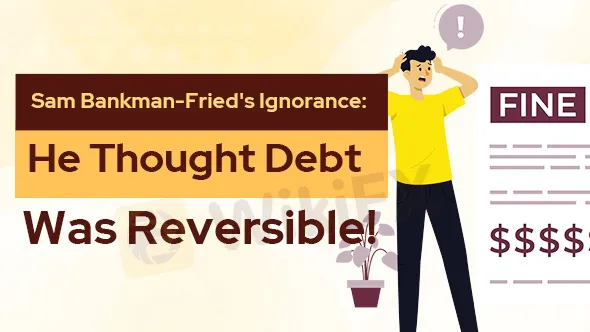简体中文
繁體中文
English
Pусский
日本語
ภาษาไทย
Tiếng Việt
Bahasa Indonesia
Español
हिन्दी
Filippiiniläinen
Français
Deutsch
Português
Türkçe
한국어
العربية
Sam Bankman-Fried's Ignorance: He Thought Debt Was Reversible!
Abstract:Sam Bankman-Fried, the founder of FTX, has taken the witness stand in his ongoing fraud trial, providing vital insights into his perception of the financial situation at Alameda Research and the alleged misappropriation of FTX customer funds, offering an intriguing look into the complex case.

In his ongoing fraud trial, Sam Bankman-Fried, the founder of FTX, has provided crucial testimony regarding his perception of the financial health of Alameda Research, his hedge fund, and its capability to cover an astounding $8 billion debt owed to the cryptocurrency exchange, FTX. Bankman-Fried revealed that he remained blissfully ignorant of the looming crisis until shortly before both entities encountered a financial meltdown. He expressed that although he was surprised by the situation, it did not raise any immediate alarms. However, this revelation came only after he had discovered that Alameda had borrowed a substantial $8 billion from deposits sent by FTX customers to the exchange.
The prosecution has levied serious allegations against the 31-year-old former billionaire, contending that he orchestrated the misappropriation of billions of dollars in FTX customer funds. These funds were allegedly diverted to bolster Alameda, invest in high-risk ventures, and even support political campaigns in the United States. If found guilty, Bankman-Fried could potentially face a lengthy prison sentence that spans decades.

Bankman-Fried, who has entered a plea of not guilty, acknowledges that he made mistakes that ultimately led to the bankruptcy of FTX in November 2022. This unfortunate turn of events had significant consequences for customers and employees of the exchange. However, he consistently maintains his innocence and denies any wrongdoing related to the misappropriation of customer funds.
Throughout his testimony, Bankman-Fried has strived to present alternative explanations for the use of funds, drawing attention to the distinctive nature of FTX as a “margin” exchange. In this type of exchange, many customers, including Alameda, borrowed funds from other users to place bets, highlighting that these practices were not unusual in the context of their operations.
During the cross-examination, prosecutor Danielle Sassoon probed Bankman-Fried about the testimony provided earlier in the trial by Caroline Ellison, who served as the former CEO of Alameda and had an on-and-off romantic relationship with Bankman-Fried. Ellison's testimony had revealed that Alameda had borrowed money from FTX customers in June 2022 to repay its lenders.
Sassoon repeatedly pressed Bankman-Fried on whether using FTX funds to repay lenders could be categorized as margin trading. In response, Bankman-Fried offered a nuanced perspective, stating that it might indeed resemble margin trading, but he neither confirmed nor denied this possibility.
Additionally, Bankman-Fried disclosed that part of Alameda's debt to FTX had originated from FTX customers depositing their funds into Alameda's bank accounts. This measure became necessary as the exchange lacked its own dedicated bank accounts.
Bankman-Fried's testimony underscores his portrayal of himself as a hands-off CEO who frequently delegated operational details to other team members. This portrayal appears to be part of an overarching strategy aimed at discrediting testimonies from former associates who have suggested that he directly ordered them to engage in illicit activities.

Disclaimer:
The views in this article only represent the author's personal views, and do not constitute investment advice on this platform. This platform does not guarantee the accuracy, completeness and timeliness of the information in the article, and will not be liable for any loss caused by the use of or reliance on the information in the article.
Read more

California Cracks Down on Crypto Scams: 42 Websites Shut Down in $6.5M Bust
California Attorney General Rob Bonta announced earlier this week that the state had taken decisive action against fraudulent cryptocurrency operations. Authorities successfully shut down 42 scam websites responsible for deceiving investors out of at least $6.5 million.

Ripple Secures Dubai License: First Blockchain Payments Provider in DIFC
Ripple gains Dubai regulatory license, becoming the first blockchain payments provider in DIFC, boosting crypto innovation in the UAE.

Why Cryptocurrency is Truly the Future of Trading?
Benjamin Bilski unveils a new crypto platform aiming to solve market inefficiencies, with decentralized liquidity pools and AI-driven trading solutions.

Bitcoin Prince Sam Lee Now Charged with Billion-Dollar Fraud
Once recognised as the Prince of Bitcoin, Sam Lee, who is also the co-founder of Hyperverse and HyperFund, is now charged with a billion-dollar fraud.
WikiFX Broker
Latest News
Trump vs. Powell: The Showdown That Will Shape Global Markets
FINRA Panel Orders Stifel to Pay $132.5M for Misleading Investors
The Future of Trading is Here: How AI is Reshaping the Market Landscape
Nigeria’s Oil and Gas Sector Gains Momentum
Gold Price Hits Record High Amid Economic Uncertainty and Policy Shifts
Could DeepSeek Be Linked to a $390 Million Fraudulent U.S. Server Deal?
Ripple Secures Dubai License: First Blockchain Payments Provider in DIFC
BSP Restricting Offshore Forex Trades to Control Peso Volatility
Retiree Loses RM2.33 Million in Investment Scam – Could You Be Next?
SEC Charges Ronald A. Pallek in $1.54 Million Fraudulent Investment Scheme
Currency Calculator






